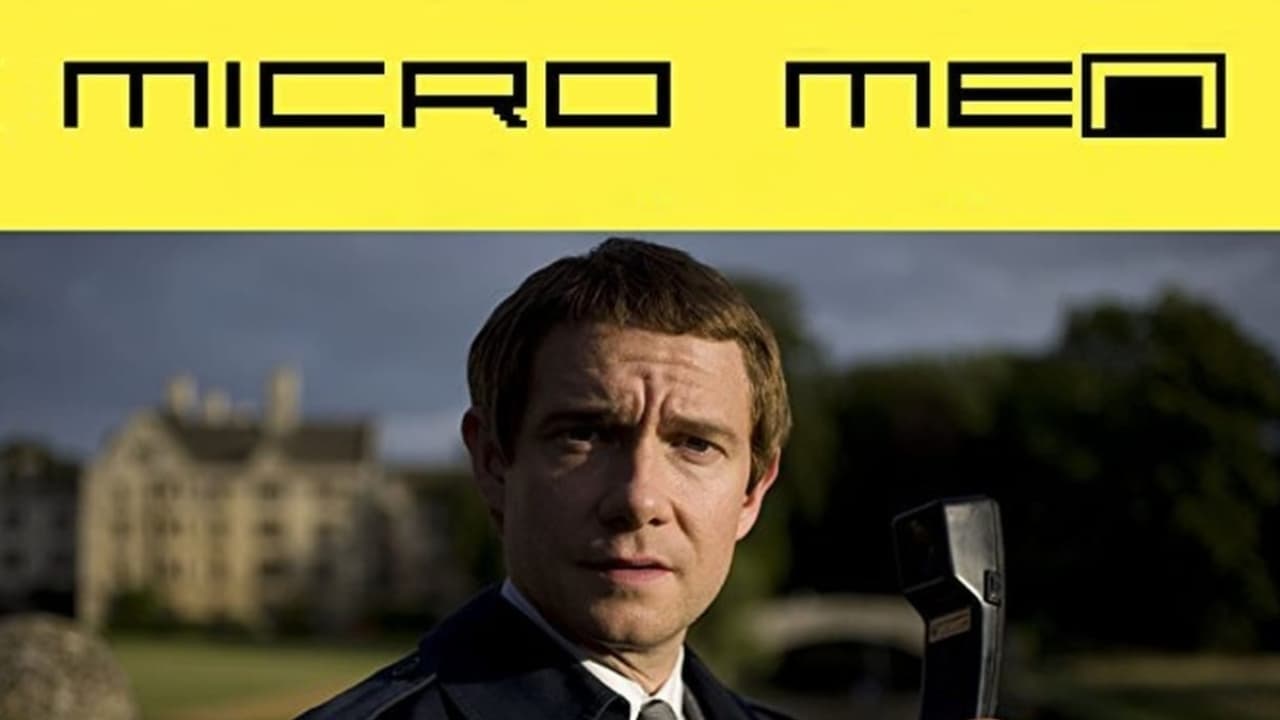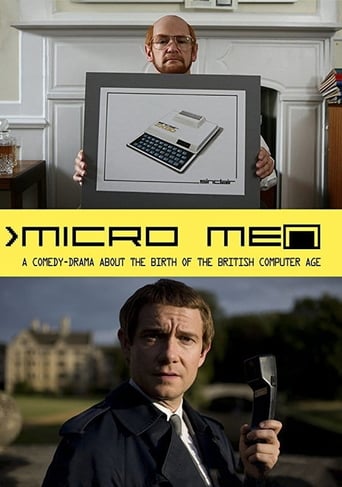

What could have been an interesting docu-drama about the birth of the UK computer industry, instead turned into something unintentionally farcical.In its efforts to create drama the film pitches Clive Sinclair as a cut-throat rogue, battling against one-time colleague Chris Curry (played by Martin Freeman). Freeman seems to be settling into being typecast into roles where he plays lovable harmless, guy next door types, and this film fits his role well.Unfortunately, Alexander Armstrong struggles to make a convincing Clive Sinclair, no doubt hindered by the terrible prosthetic bald head/wig and ridiculous accent. Its possible the prosthetics may have prevented him from turning his head and his performance seems terribly stiff throughout. The viewer is left with an unfair impression that Sinclair was a humourless, uncharismatic maniac - flying off the handle at the slightest upset.A lot of the comedy in the film (at least the intentional comedy) seems to come from situations which are unfortunately completely unbelievable. Clive screaming down the phone and then launching it (cordless apparently) through a door for example, or the ridiculous attempts to stall the BBC before the boffins at Acorn realise that the key issue preventing a computer from working is a huge wire that needs cutting in two.Its a shame that the film hides the technical breakthroughs that were made in that period with mumbo-jumbo references to computer chips, and reduces the creativeness of these industry leaders to simply picking the right advertising poster to use.
... View MoreI watched this single piece drama last night on BBC4 and thoroughly enjoyed it from start to finish.All the actors did a fine job and convinced - despite Mr Armstrong's (Sinclair) rather obvious makeover for the role. The mixture of archive footage and new filming hit a balance that was enjoyable.The programme addresses the beginnings of the Home Computer industry in the UK and the roles & rivalries of Sinclair and Acorn in those early days. For those of us of a certain age it was extremely nostalgic stuff (even though I ended up getting a CBM 64)! A mixture of reality, light comedy and invention (some scenes were 'invented' according to the titles) kept me engrossed and actually rather disappointed that it had finished so soon; I think a 2 part show would have kept me interested.Some of the most fascinating stuff for me was a reminder of some of the side issues, for instance the UK general public's initial reaction to the technology - those of us who bought them were considered 'hobbyists' at the time. However, on reflection possibly the most important side- effect was the fact that a public organisation like the BBC was allowed to pursue the making of its own branded model in an attempt to raise the nation's computer literacy above other's. The BBC model B sold widely in schools, this combined with the home market growth must surely have contributed enormously to the strength of the UK programming industry (of which I was part) in the formative years. Whilst never rivalling IBM and HP in the end (as poignantly if somewhat mawkishly shown in the final scenes) this era and the people involved, must be considered as a time which generated huge revenue for the UK as well as a great platform for the public to get to grips with computers. Our programmers are still regarded as some of the world's most creative, despite financial difficulties; and this period ensured that as a nation we are not only regarded for older, but venerable, media such as the pop music & individual greatness in film & drama.Highly entertaining as a drama, thought provoking if you care about the beginnings of the industry; I was entertained and amused throughout. Recommended.
... View MoreThis was a generally enjoyable watch and I'm grateful that anyone would make a programme on such a "niche" topic, however it was not without flaws. For a start, as has been mentioned by other reviewers, Sir Clive is painted as borderline psychotic with serious anger management problems, whereas Curry is some kind of super-good Luke Skywalker of the computing world. I'm sure it can't have been as clear-cut as this. It's also true that Alexander Armstrong's acting is very mannered and feels like something out of a comedy sketch show, while Martin Freeman gets to act much more naturally.The second problem is really just an anachronism caused by poor library footage placement. At the computer fair/exhibition we see the team telling reporters about the capabilities of the new Acorn Atom, and we also see Clive Sinclair talking to the Sinclair User journalist about issues to do with the "new" ram pack for the ZX81. Even leaving aside whether these two events happened at the same computer fair, since blah blah artistic license etc., there are two pieces of library footage shown, as if they are taking place at the same event. The first piece of film shows some schoolboys using some computer that I can't identify from the clip, playing a game, then the next clip shows a man trying out an Amstrad CPC464. This computer wasn't introduced until much later: 1984 in fact and is really out of place. I don't know about other people but it caused me anguish seeing it.
... View MoreJust saw this on BBC4. A very interesting take on how close the UK came to dominating the world computer development and manufacturing industry in the early 80s, only for it to all fall apart just 5 years later.Despite some garish and unconvincing make-up, Armstrong shows he can do serious drama in his portrayal of Sir Clive Sinclair, the man who brought affordable computing to the masses. Martin Freeman is good (as always) as the confidante in Sinclair's company who, unable to understand Sinclairs bloody mindedness over what to concentrate their efforts on, leaves and sets up arch rival 'Acorn Computers' with an Austrian business partner.The production team have done a solid job in displaying the drabness of the era. The mix of archive TV footage of the time inter-cut with this filmed TV drama works quite well. The background story of how the UK became a world leader in the home PC market, and then blew it, is a fascinating tale for anyone interested in recent history. At one point Freemans character turns to Sinclair and says 'We could have been the British IBM but you wouldn't listen to me' is very apt. Sinclairs obsession with the notorious C5 is also addressed. It does make you wonder what would have happened had there been more cohesion in the industry at the time rather than the arrogant self interest of the industry that resulted in the UK losing such a massive foothold.A thought provoking drama that has just enough momentum to keep itself interesting despite some flaws.
... View More